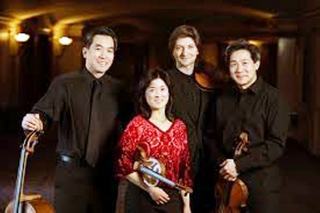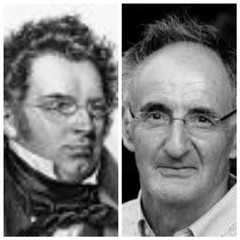|
Back
The Music (and Words) of Friends New York
Bohemian National Hall, 321 East 73rd Street
12/14/2017 -
Franz Schubert: Octet in F Major, D. 803
Aspect Foundation for Music and Arts Presentation: Misha Donat (Illustrated talk), Alexander Bedenko (Clarinet), Joseph Anderer (Horn), William Short (Bassoon), Brendan Kane (Double Bass), Ying Quartet: Robert Scott, Janet Ying (Violins), Philip Ying (Viola), David Ying (Cello)

Ying Quartet: D.Ying, J. Ying, R. Scott, P. Ying (© Mkiartists)
“This is musical entertainment, on the highest level.”
Misha Donat, last night on Franz Schubert’s Octet
The “Aspect Foundation for Music and Arts” is one of New York’s singular organizations which goes largely ignored by the musical Press (including this writer, who was ignorant of its existence). Basically, instead of simply presenting a pretty distinguished coterie of artists, they find commentators offering talks, illustrations and anecdotes about the music to be performed.
Their official flyer reads, “We aim to transform a traditionally auditory experience...creating a thought-provoking amalgam of performance, lecture, and discussion...Our central objectives, are to support and promote artists, to enlighten and inspire audiences through intellectually charged collaborations between musicians and speakers, and to forge meaningful and lasting connections between artist, audience and repertoire.”
Whew! That’s a lot of information for general New York audiences, for whom music (at least music before, say, 1910) is a social occasion with instrumental accompaniment. Granted, Leon Botstein usually offers the most eclectic knowledge of musical/historic context. Alan Gilbert has introduced music of the New York Phil with a few choice words. And Esa-Pekka Salonen invariably has trenchant knowledge as composer and conductor with which to involve his audiences.
The Aspect Foundation follows this, but with a more formal touch.
Their next programs will be at Columbia University’s Italian Academy (founded by Mozart’s librettist, Lorenzo da Ponte), but last night, Bohemian Hall was packed to the rafters for a single not rare early 19th Century work, Franz Schubert’s Octet. I don’t know their other motivations for listening to one piece of chamber music, but possibly it was also to be “educated” with a genial 20-minute introduction by Misha Donat.

F. Schubert/M. Donat (© Wikipedia.commoons/Martin Randall.com)
Mr. Donat’s credentials for Aspect were ideal. He was a senior music producer at BBC Radio 3 for a quarter-century, now doing program notes festivals in Aldeburgh and Edinburgh, Wigmore Hall and the Festival Hall. His words, though, were less for analysis than for anecdote and historical background.
And that seemed to fit the audience (and this writer) perfectly fine. With the screen illustrating the various personages of early 19th Century Vienna (a “small town” in his words, hardly the cosmopolitan city we might envision), he told how Schubert’s adulation of Beethoven never resulted in meeting his idol.
(Difficult to believe, there was neither texting nor Smartphones in those days, so he paid a visit unannounced to the Great Man’s home, but Beethoven was out. Probably sipping his lager and bellyaching at the nearest tavern.)
Schubert, though, was well-known enough to carry Beethoven’s coffin during the great funeral ceremony. And Mr. Donat had managed to find a picture of that grand occasion.
Schubert also, when asked to write a piece with winds, he almost exactly copied Old Lud, adding a second violin and another movement.
That was the Octet, for which Mr. Donat provided good words about the first movement, and very little about the rest. Though he did mention how Schubert was the first composer to use his songs–for which he owed 100 percent of his fame in those days–as a basis for other chamber music. In this case the theme and variations. That, as well as the fact that the music was not unearthed many years from its creation.
A more detailed analysis was found in Mr. Donat’s splendid program notes.
His 20 minutes were enough for a hearing of the Octet with some terrific musicians. Mr. Donat had noted that the piece was an “entertainment” (of the highest level). The Ying Quartet and the wind players did swing through the work with few pauses and some very punchy movements.
The introduction to the first movement was played with some severity. But the Finale introduction was truly dramatic. I hadn’t realized until this performance that it was an exact theme from the Trio of Beethoven’s Seventh Symphony third movement.
That finale also provided the most dramatic moment, when the thunder-rumbling cleared away, giving forth sunshine and flowers–until it returned again. The way the Ying Quartet and the others played it, one felt that one jolt of pain which one feels in the most ebullient movements of the composer.
What was most astonishing here were the truly difficult instrumental creations. Could an 1824 French horn have handled those arduous tunes in the first movement coda with the deftness of Joseph Anderer? One wonders. Yet Mr. Anderer was equally splendid in his silences. The first moments of the Adagio no notes were played. Yet when he joined bassoonist William Short and clarinetist Alexander Bedenko, it was a moment of elation.
The Ying Quartet specializes in contemporary music, so this was, superficially, not so challenging. Yet the harmonies, the balance with the winds, must have had its problems, though we felt them not.
I was intrigued with Robert Scott’s tone. At first, one felt it a bit thin, perhaps not First Violin-ish enough, lacking brio or energy. Soon it became clear that this was Mr. Scott as part of an ensemble which was almost symphonic, and that he was perhaps holding back, preparing for the sensitive duets with clarinet and horn.
At the end, we had a performance which could be described as light poetry. The eight players were not flashy, never idiosyncratic. They played the Octet like all chamber music, as “the music of friends.” And if one didn’t leave Bohemian Hall with the feeling of musical profundity, the crispy New York winter weather was complemented by the warmth of this performance.
CODA: The Aspect Foundation has four more excellent concerts through May. More information may be had by emailing www.aspectfoundation.net. Well worth the effort.
Harry Rolnick
|